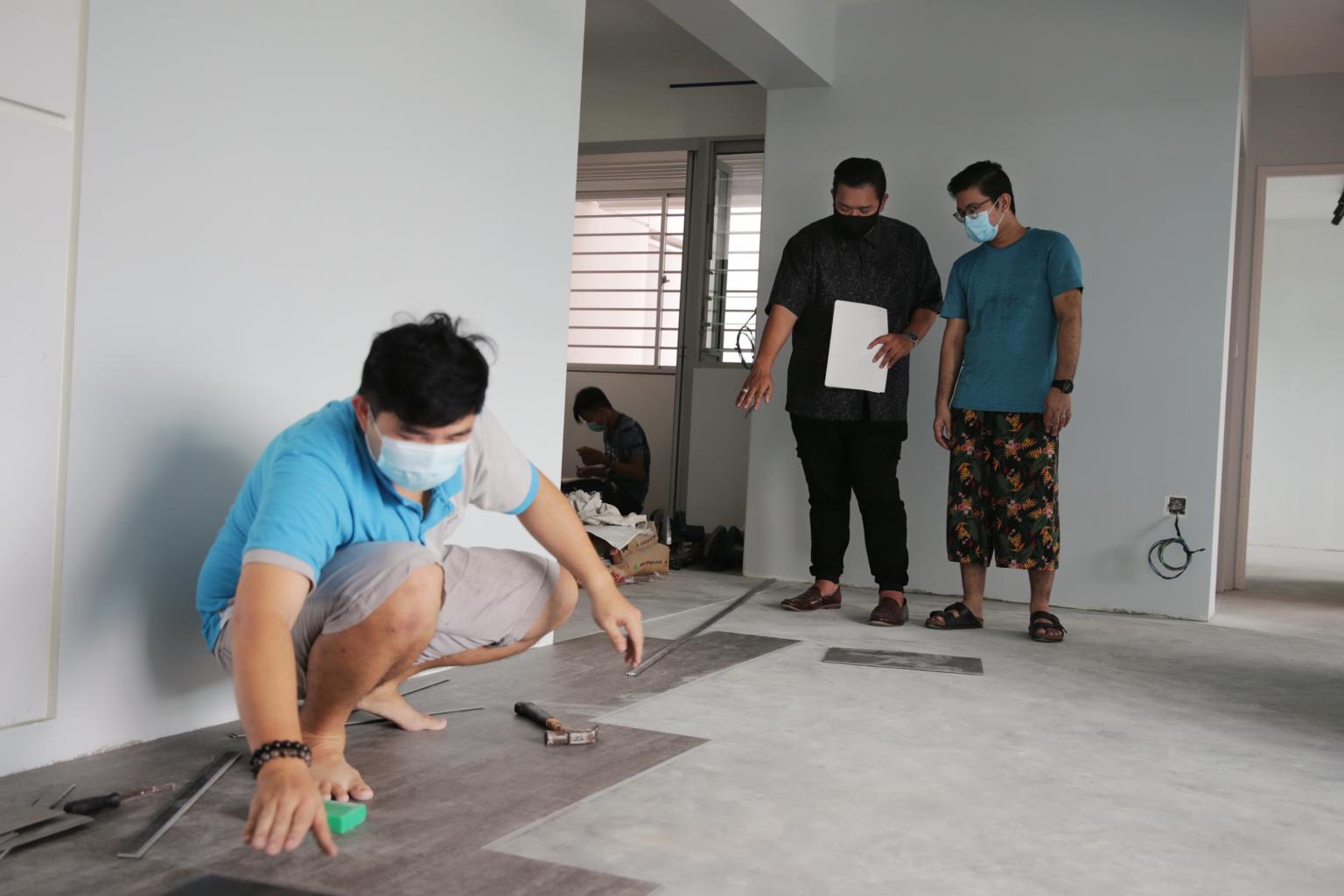COVID-19 SPECIAL
Owners may pay up to 20% more for home renovation as interior design firms face manpower shortage
Sign up now: Get ST's newsletters delivered to your inbox

Renodiction's founder Azri Abbas (second from right) with his client Abdul Hadi (right) at Mr Hadi's Sengkang flat.
ST PHOTO: GIN TAY
Follow topic:
SINGAPORE - Not only has Mr Abdul Hadi's home renovation completion date been delayed by three months, but the 31-year-old is now looking at an additional $2,000 to $3,000 in renovation costs.
The increase in costs is due mainly to manpower shortage faced by Renodiction, the local interior design (ID) company he engaged, as skilled workers, such as carpenters, plumbers and electricians remain stuck in Malaysia.
Home renovation works, which were halted during the two-month circuit breaker period, have been facing delays even after works were allowed to resume after the easing of circuit breaker measures on June 2.
But Mr Hadi, who works as a safety officer in the construction industry and has experienced similar labour shortage first-hand, is taking it in his stride.
"When the Covid-19 situation became serious, I had pre-empted my wife that costs will go up, so we had set aside some money as a buffer. As someone in the construction industry, I understand our ID's perspective and I don't want to pressure him on that front," said Mr Hadi, who is expecting a second child in September with his homemaker wife, 40.
Renovations for their four-room Build-To-Order (BTO) flat in Sengkang were expected to be completed by the end of May, but this has been pushed back to end-August.
Like Mr Hadi, more home owners will likely have to pay more for renovation works, as the renovation industry, which is heavily reliant on Malaysian workers, continues to struggle with labour shortage.
Home renovation costs have increased by 10 to 20 per cent industry-wide in recent weeks, compared to pre-Covid-19 days, according to contractors and ID companies interviewed by The Straits Times.
On Friday (July 31), the Building and Construction Authority (BCA) told The Straits Times that around 60,000 renovation projects have been approved, including 24,000 residential projects that were previously suspended.
While Mr Hadi can empathise with the predicament contractors and ID companies are in, the increase in costs, coupled with multitudes of delays, may be a tough pill for other home owners to swallow.
Dr Sky Tan, president of the Singapore Renovation Contractors and Material Suppliers Association (RCMA), said companies will either absorb the costs or pass it on to their new customers, although most firms will try to negotiate for the best price with their vendors and suppliers before doing so.
He added that firms will have to factor any possible cost increase into their quotations to new customers, while honouring the stated prices on contracts with existing clients signed before Covid-19 hit.
Around 80 per cent of workers in the trade are Malaysians, said Dr Tan.
Companies are now pinning their hopes on the resumption of cross-border travel between Singapore and Malaysia, for which will applications will kick off on Aug 10.
Long-term pass holders and travellers on essential or official business will benefit from the reciprocal green lane and the periodic commuting arrangement.
To ensure projects can go ahead, some ID companies have had to hire local workers, who command a higher rate, or make do with a reduced pool of workers.
Renodiction's founder Azri Abbas, 43, said around 70 per cent of his workforce are back at work, as the foreign workers he employs have been cleared of Covid-19 and are allowed to leave their dormitories to resume work. The remaining 30 per cent are Malaysians.
All of his eight ongoing projects have been affected, with costs going up "a bit here and there".
"I tell my clients, if they don't want to pay extra and are okay to wait a little longer, I'll use my Malaysian workers to complete their homes when they are allowed to come into Singapore. But if they want it completed fast, I will have to hire more local workers so costs will naturally go up a little," he said.
Bigger companies that have their own in-house subcontractors have it slightly easier, as they are able to prioritise available workers for their own projects, instead of relying on external contractors.
Mr Alloyious Koh, 29, chief creative consultant of Carpenters Design Group, said his company is able to manage some of the bigger renovation works such as carpentry, hacking and painting with its current workforce.
Workers who are still in Malaysia make up around 40 per cent of his headcount. They are mainly in charge of works such as tiling and false ceiling installations.
Mr Koh said he takes a case-by-case approach when managing manpower for his 80 to 100 ongoing projects.
"For clients who don't have an alternative place to live in or are paying money for rental flats to stay in the interim, we'll try to prioritise their projects if we have the manpower to do so. We're not a heartless company," he said.
Mr Michael Ong, 40, founder of TBG Interior Design, said 90 per cent of his workers are back on work sites, with the remaining 10 per cent still stuck in Malaysia.
Mr Ong has opted to absorb the additional costs for contracts that were signed before the circuit breaker period. He estimates at least three out of the 12 ongoing projects will not yield any profit, while his overall revenue has dipped 30 to 40 per cent.
He said: "Now it's really just wait and see if we can sort out travel agreements with Malaysia. But even then, we must be prepared that it may not be the full workforce."

